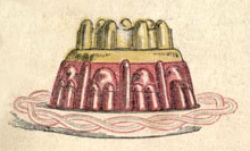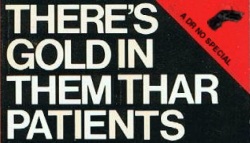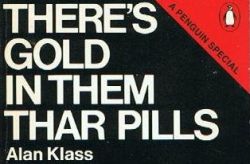 The title for this post arises because Dr No has idly been playing Shorter Titles, the I’m Sorry I haven’t A Clue game in which panellists are invited to submit film (or song) titles where a single letter omission changes the meaning – Oldfinger, The King’s Peech, Rear Widow, The Godfarter, The Tird Man, that sort of thing – but as Jack Dee would say, they don’t work in print – the original title here being Left Shift, the hypothetical statistical fancy much beloved of the medical Islingtonistas who favour alcohol minimum unit pricing. Left shift is the notion that in populations the body wags the tail: the mean determines the extremes. Applied to alcohol minimum pricing, left shift has it that if average consumption falls because of raised minimum unit prices, then so too will heavy consumption fall. Populations, according to this hypothesis, behave like a blancmange made with excess gelatine: a nudge in the middle, and the whole pud moves across.
The title for this post arises because Dr No has idly been playing Shorter Titles, the I’m Sorry I haven’t A Clue game in which panellists are invited to submit film (or song) titles where a single letter omission changes the meaning – Oldfinger, The King’s Peech, Rear Widow, The Godfarter, The Tird Man, that sort of thing – but as Jack Dee would say, they don’t work in print – the original title here being Left Shift, the hypothetical statistical fancy much beloved of the medical Islingtonistas who favour alcohol minimum unit pricing. Left shift is the notion that in populations the body wags the tail: the mean determines the extremes. Applied to alcohol minimum pricing, left shift has it that if average consumption falls because of raised minimum unit prices, then so too will heavy consumption fall. Populations, according to this hypothesis, behave like a blancmange made with excess gelatine: a nudge in the middle, and the whole pud moves across.
Month: November 2012
Exception Report
 Twitter health news of the weekend was iDoc, a Department of Health initiative to slash surgery visits by replacing them with technology, and so save nearly £3 billion. The fire was started late on Saturday evening at 11:11pm – 11 minutes, Dr No notes, after the end of The Killing (BBC Four), the Danish villains in high places procedural – by the ever vigilant Dr G, who tweeted ‘High hopes for IT at the GP’s surgery’ and linked to the next day’s Sunday Expresso front page: “END OF THE DOCTOR’S SURGERY”. By Sunday morning the story was crackling nicely round twitter. Doctors would be replaced with iDocs, noctors by iNocs, and patients by iPocs. Skypesults and tweetsults would replace consults, and hashtags like #squits and #spotteddick would trend, allowing the @CMO to gauge at any time the #healthofthenation. It was not, it is fair to say, a vision which was warmly welcomed by medical tweeters and bloggers. Dr No even wrote a post, but choose not to publish, unlike McMargo, who rounded the day off with a heartfelt post that warned over-adoption of medical IT risked throwing granny out with the tea leaves. Dr No couldn’t agree more.
Twitter health news of the weekend was iDoc, a Department of Health initiative to slash surgery visits by replacing them with technology, and so save nearly £3 billion. The fire was started late on Saturday evening at 11:11pm – 11 minutes, Dr No notes, after the end of The Killing (BBC Four), the Danish villains in high places procedural – by the ever vigilant Dr G, who tweeted ‘High hopes for IT at the GP’s surgery’ and linked to the next day’s Sunday Expresso front page: “END OF THE DOCTOR’S SURGERY”. By Sunday morning the story was crackling nicely round twitter. Doctors would be replaced with iDocs, noctors by iNocs, and patients by iPocs. Skypesults and tweetsults would replace consults, and hashtags like #squits and #spotteddick would trend, allowing the @CMO to gauge at any time the #healthofthenation. It was not, it is fair to say, a vision which was warmly welcomed by medical tweeters and bloggers. Dr No even wrote a post, but choose not to publish, unlike McMargo, who rounded the day off with a heartfelt post that warned over-adoption of medical IT risked throwing granny out with the tea leaves. Dr No couldn’t agree more.
Supping With a Short Spoon
 Just as there is gold for drug companies in them thar pills, so there is gold for GPs in them thar patients. Historically, GPs were paid chiefly on a patient head-count basis, topped up with item of service fees for ‘extras’ such as vaccinations and contraception. The simplest way for GPs to boost income under this system was to increase list size, sometimes to absurd levels where the GP could not hope to provide adequate care for all the patients on the list. Some even gamed the system, by sneaking ghost patients on their lists. Governments disliked crude head-count based pay, not least because it offered no scope to influence GP activity. Item of service payments were an attempt to change that, but the capitation fee was still paid whatever the doctor did, or didn’t, do. The below par golfing GP trousered the fee in equal measure to his more conscientious colleague on the other side of town.
Just as there is gold for drug companies in them thar pills, so there is gold for GPs in them thar patients. Historically, GPs were paid chiefly on a patient head-count basis, topped up with item of service fees for ‘extras’ such as vaccinations and contraception. The simplest way for GPs to boost income under this system was to increase list size, sometimes to absurd levels where the GP could not hope to provide adequate care for all the patients on the list. Some even gamed the system, by sneaking ghost patients on their lists. Governments disliked crude head-count based pay, not least because it offered no scope to influence GP activity. Item of service payments were an attempt to change that, but the capitation fee was still paid whatever the doctor did, or didn’t, do. The below par golfing GP trousered the fee in equal measure to his more conscientious colleague on the other side of town.
Big Pharma’s Little Helpers
 The idea the there is gold in them thar pills is, one might say, as old as the hills: the book on the left was published in 1975. But it sure is a rum old business. Dr No’s last post highlighted the paradox that, even for drugs that do work, for most patients, most drugs don’t work. This naturally enough in today’s world of evidence based medicine begs the question: why do doctors prescribe, on the industrial scale they do, when the evidence shows most of the time, most drugs don’t work? The answer, Dr No suspects, not necessarily quite so straight forward as at first it may seem, and may even have more to do with blind faith than scientific evidence.
The idea the there is gold in them thar pills is, one might say, as old as the hills: the book on the left was published in 1975. But it sure is a rum old business. Dr No’s last post highlighted the paradox that, even for drugs that do work, for most patients, most drugs don’t work. This naturally enough in today’s world of evidence based medicine begs the question: why do doctors prescribe, on the industrial scale they do, when the evidence shows most of the time, most drugs don’t work? The answer, Dr No suspects, not necessarily quite so straight forward as at first it may seem, and may even have more to do with blind faith than scientific evidence.
